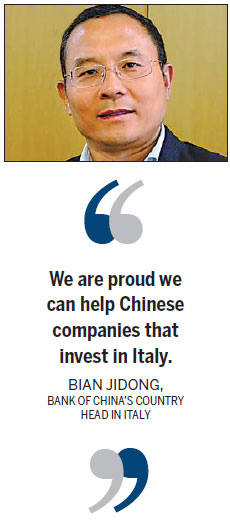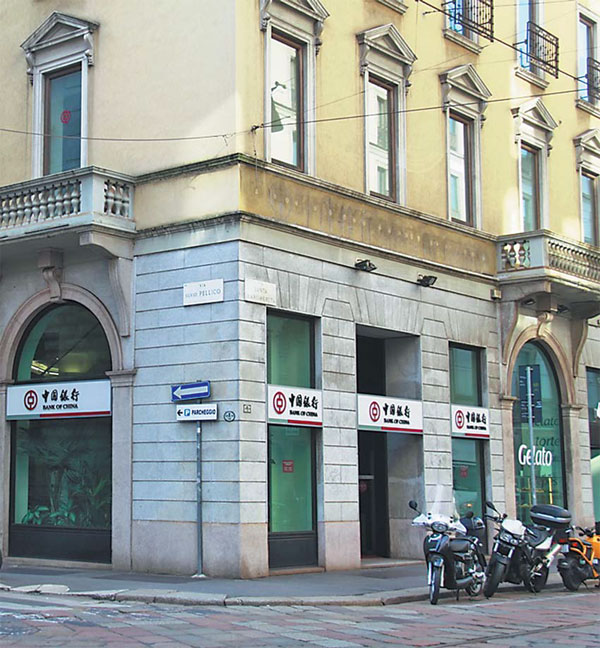For bank, Milan offers more than fashion
Updated: 2015-06-19 06:55
By Cecily Liu(China Daily Europe)
|
|||||||||||
Domicile in Italy's financial nerve center provides perfect launch pad for expansion
The growing number of business connections between China and Italy has paved the way for Bank of China's rapid expansion in the country since 1992, when it established a presence.
From the bank's initial goal of serving Italian companies that do business in China, the bank's customer base has expanded to serve Italy's local Chinese population as this community grew, but in more recent years a wave of Chinese acquisitions in Italy has led to new business opportunity for the bank.
|
The office building of Bank of China's Italy branch in Milan. The bank has more than 100 corporate customers that use its renminbi services. Photos provided to China Daily |
"From the changing structure of our customer base, the growing strength and outward expansion of Chinese firms can be clearly seen," says Bian Jidong, Bank of China's country head in Italy.
"We are proud we can help Chinese companies that invest in Italy, because to a certain extent how far China's firms can go global depends on how far Chinese banks can serve them in international markets."
In the years after the financial crisis, many cash-strapped companies in Italy with advanced technologies have become clear targets for Chinese companies, and Bank of China has helped finance many of these deals.
"Bank of China has the advantage of having worked with these Chinese companies in China," Bian says.
"So we understand their business, culture, credibility and financial strength, and are more confident of guaranteeing them loans when foreign banks with less knowledge of Chinese firms feel unsure."
In the case of small deals, Bank of China's Italy branch finances them itself. An alternative way of financing such deals is to work with other European branches of Bank of China or branches in China.
As Bank of China's lending and financing capability in Italy may be limited, one way for it to take on large mergers and acquisitions deals is to organize a group of banks to finance the deals, sometimes involving other Chinese banks and sometimes Western banks.
"We act as the organizer of these deals, and we receive a commission, which is a substantial return without risk, and risk management is very important in our expansion strategy because we want to grow steadily and securely," Bian says.
Bank of China began operating in Italy in 1992 with a representative office in Rome, where the central bank is located. In 1998 it opened a branch in Milan, the country's financial nerve center, and that is now the bank's Italian headquarters.
It has opened two other branches, one in Milan's Chinatown and the other in Rome. Together the three branches employ about 60 people, of whom a third come from China, and the rest are locally hired.
Bank of China's Italian expansion has been aided by the internationalization of the renminbi, which started to pick up pace in 2008 when then-president Hu Jintao announced that China planned to develop policies in this area.
At the time, China determined that global reliance on the US dollar as the dominant currency was unsustainable and that international use of the renminbi should reflect China's trade and investment flows with the rest of the world.

Such a policy focus from China has led to a new wave of capital account relaxation in China, and use of the renminbi in international trade and investment has greatly increased.
Bank of China Italy has more than 100 corporate customers that use its renminbi services, the bank says, with aggregate transactions totaling more than 20 billion yuan ($3.2 billion; 2.9 billion euros). Some are Italian companies that trade with China and use renminbi to settle their trade, avoiding exchange rate risks.
Some Italian firms that have significant cash denominated in euros change their money into renminbi to gain from its appreciation and avoid losing money through depreciation of the euro.
Bank of China in Italy is preparing to strengthen its investment banking activities, with the hope of further engaging in renminbi bond issuance for its customers and provide tailored renminbi products for its retail and business customers to invest in and gain good returns, Bian says.
The advantage of issuing offshore renminbi bonds is that this raises capital in renminbi, which is more abundant than many other currencies. Businesses can then use the funds raised either in China or swap them for other currencies.
The tailored renminbi products are investment options that have returns linked to renminbi and other financial assets in China's capital markets, but the products are structured in a way that the investments and returns generated are denominated in euros, to help the bank's Italian customers.
"We hope to create these financial products to give our Italian customers an extra choice in terms of investment options, and the products have great potential to generate good returns because of the Chinese market's growth," Bian says.
Over the years an increasing number of Italian businesses have chosen Bank of China to manage their accounts because of its strong rating and its ability to lend renminbi to companies.
Bian says: "As a result of the euro zone crisis many Italian banks' credit ratings have fallen, but Bank of China's credit rating has always been A equivalent, and because large Italian firms need to disclose their banking partner in end-of-year annual reports, many choose Bank of China because our credit rating contributes to their credibility."
As a branch, Bank of China's headquarters rating is automatically the rating of Bank of China Italy, and because of the financial strength and credibility of its headquarters, Italian firms regard the bank highly, Bian says.
When Bank of China provides finances to Italian companies it may provide a part of the finances in renminbi, which many Italian firms would hope to use for their China subsidiary activities.
Seeing the huge benefits of renminbi internationalization, Bian's staff at Bank of China Italy has also frequently talked with the Italian government and the central bank about creating an offshore renminbi center in Milan.
For that to happen, the city would need to have an offshore renminbi clearing bank that has a clearing channel in direct partnership with the People's Bank of China, to ensure fast and efficient cross-border transactions.
Bian says he feels progress is being made and that the Italian government is considering how to advance discussions with its Chinese counterpart to build Italy's renminbi offshore activities strength.
The Italian government is watching the offshore renminbi market closely, and is keen on further talks about supporting renminbi offshore activities in Italy, Bian says.
In April, Bank of China hosted a renminbi conference attended by representatives of the Italian government, the Italian central bank and other industry experts.
Many of Bank of China's senior managers from China attended, again making the case for renminbi offshore activities, and the conference was a great success, Bian says.
Because of the bank's renminbi business strength in Italy, it has developed partnerships with six local Italian banks and provides renminbi clearing services to them.
cecily.liu@chinadaily.com.cn
(China Daily European Weekly 06/19/2015 page14)
Today's Top News
Visa process for Chinese traveling through Europe streamlined
Grexit risk hikes
The most costly cities for expats
China, Russia sign railway deal
No mistreatment of GSK sleuth: Govt
Lies and false hopes entrap Xinjiangers
EU seeks to ban animal cloning
HK lawmakers reject election reform proposal
Hot Topics
Lunar probe , China growth forecasts, Emission rules get tougher, China seen through 'colored lens', International board,
Editor's Picks

|

|

|

|

|

|







